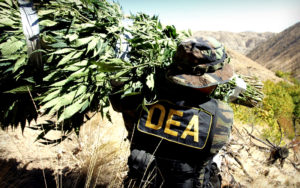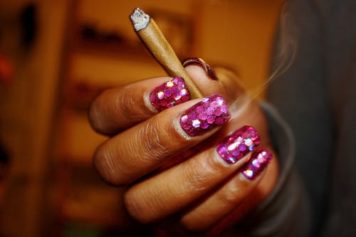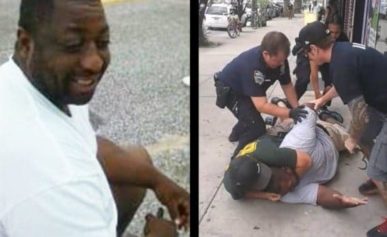The war on drugs has been a war on Black people, with clear racial disparities in how whites and people of color are treated in the criminal justice system. Part of the problem has been the criminalization of marijuana, which has been used to arrest and jail a multitude of young Black and Latino men, even as white entrepreneurs are poised to make a killing in states that have legalized the substance.
Now, former U.S. Attorney General Eric Holder says it is ridiculous that marijuana is classified as a Schedule I substance like heroin — reserved for the most dangerous and highly abusive drugs which have no medical use. Of course, he is no longer in charge of the Justice Department and was in a position to do something about it, but better late than never.
“I certainly think it ought to be rescheduled,” Holder told PBS’ Frontline. “You know, we treat marijuana in the same way that we treat heroin now, and that clearly is not appropriate. So at a minimum, I think Congress needs to do that. Then I think we need to look at what happens in Colorado and what happens in Washington.”
Holder said that he had a “slow evolution” on the subject rather than a turning point, from his days as a judge when he dealt with mandatory minimum sentences and people being sent to prison for small amounts of drugs.
When he arrived at the Justice department, “I made a determination early on that we had to make some really fundamental shifts in the way in which we were approaching this whole struggle with drugs,” he said.
Now, Holder has veered in the direction of decriminalization.
“I think that certainly that ought to be a part of the conversation,” he told Frontline, calling for the country to view drugs as a public health matter. “You know, where do we want to be as a nation? Now, there’s certain drugs I just can’t see. It’s hard for me to imagine ever decriminalizing crack cocaine, drugs like that. But the whole question of should marijuana be decriminalized, I mean, that’s a conversation I think that we should engage in.”
Colorado, Washington, Alaska, Oregon and Washington, D.C., have legalized recreational marijuana use, and some states have decriminalized possession of small amounts of marijuana. While in office, Holder did signal an interest in a police change toward marijuana, and he testified in that regard before Congress in 2014. However, he did not act on this, drawing criticism from advocacy groups. While President Obama has stated he is “more than glad to work with Congress” on this issue, some argue the attorney general can unilaterally reschedule drugs such as marijuana.
“It’s nice to have Holder’s support for this sensible policy change, but it would have been a lot better if he’d exercised the power to get marijuana rescheduling done while he was still in office,” Tom Angell, chair of the advocacy group Marijuana Majority, told Nick Wing of the Huffington Post. “We know that Holder and President Obama are good friends, so I hope the former attorney general encourages his former boss and his successor Loretta Lynch to follow through during these final months of the administration and get the job done.”
Lynch, Holder’s replacement, has taken a different stance on marijuana.
“I can tell you that not only do I not support legalization of marijuana, it is not the position of the Department of Justice currently to support the legalization, nor would it be the position should I become confirmed as attorney general,” she said at her confirmation hearing last year, as reported by the International Business Times.
On the marijuana.com blog, Angell noted that moving weed from Schedule I to the less restrictive Schedule III or lower would lead to a number of positive changes, such as expanding opportunities for medical research, protecting federal employees who use marijuana from being fired, and allowing federal tax deductions for marijuana businesses in states where pot is legal. And such a move could lead to other reforms, as it would send a strong signal to the states that the federal government has begun to address the past mistakes of a flawed policy.
As the debate continues, Black people remain behind bars. The damage of misguided, race-driven drug policy has been great for Black communities, who are not the primary consumers of these substances. As the Huffington Post reported in 2013, white people are far more likely to take illicit drugs such as cocaine, marijuana and LSD. Yet, Blacks are far more likely to land in prison, as the police target the Black community and not the neighborhoods where white folks live.
While 10 percent of Blacks and Latinos have used cocaine, 20 percent of whites have done so, and even more whites have tried marijuana, hallucinogens, pain relievers such as OxyContin, and stimulants like methamphetamine. Crack use is only slightly higher among Blacks than whites. However, Blacks are arrested for drugs at a rate triple that of whites, according to Human Rights Watch in 2009. Further, according to the Bureau of Justice Statistics, of the 225,242 people serving state prison time for drug offenses in 2011, 45 percent were Black and 30 percent were white.


